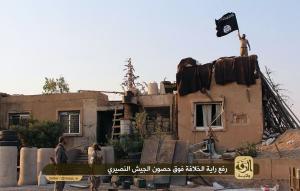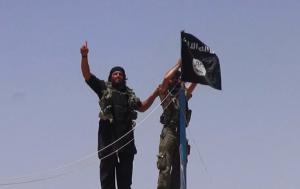Damascus (AFP) - Islamic State jihadists boasted Thursday they had executed scores of Syrian troops after capturing a key air base, the latest in a string of abuses that have shocked the world.
News of the killings came as US President Barack Obama weighed air strikes on IS positions in Syria and edged closer to greenlighting a mission to aid Shiite Turkmen trapped in an Iraqi town besieged by the jihadists.
It also came as rival Islamist rebels led by Al-Qaeda affiliate Al-Nusra Front seized 43 UN peacekeepers on the Golan Heights, part of a mission that has monitored an armistice between Syrian and Israeli troops on the strategic plateau for decades.
IS posted grisly video footage on the Internet of scores of bodies heaped in the desert they boasted were those of Syrian soldiers they captured and executed following its seizure of Tabqa air base.
The jihadists have repeatedly posted gruesome videos, which have appalled international opinion but served as a propaganda tool to recruit volunteers.
Britain-based monitoring group the Syrian Observatory for Human Rights said that IS had executed at least 160 soldiers, among some 500 who had made a desperate bid to escape to government-held territory after their defeat last Sunday.
The footage posted by IS showed a close-up of some 20 bodies, but then panned out to show scores more.
View gallery

Image made available by Jihadist media outlet Welayat Raqa on July 25, 2014, claims to show members …
Other shots showed men barefoot and dressed only in their underwear walking in line with their hands on their head in surrender, escorted by jihadist gunmen.
One held up the black flag of the jihadists. Others chanted: "Islamic State forever."
Tabqa was the last position in Raqa province to fall to the jihadists, who now control a vast swathe of northeastern Syria and Iraq.
A UN-mandated probe has charged that public executions, amputations, lashings and mock crucifixions have become a regular fixture in jihadist-controlled areas of Syria.
Obama was to meet with top national security aides at 2000 GMT to decide whether to expand US air strikes launched against IS in Iraq earlier this month to its strongholds in Syria.
The Syrian government launched air strikes of its own on Thursday, killing six IS leaders, the Observatory said, but Washington has so far baulked at cooperating with Damascus against the group.
View gallery

Image made available by the jihadist Twitter account Al-Baraka news on June 11, 2014 claims to shows …
- UN peacekeepers held -
Rival jihadists of Al-Nusra Front, backed by other rebels, detained 43 Fijian peacekeepers on the Golan on Thursday, a day after their capture of the sole crossing over the UN-patrolled armistice line to the Israeli-occupied sector of the plateau.
"Forty-three peacekeepers from the United Nations Disengagement Observer Force were detained early this morning by an armed group in the vicinity of Quneitra," a UN statement said.
The 43 peacekeepers from Fiji were forced to surrender their weapons and taken hostage, but 81 Filipino blue helmets "held their ground" and refused to disarm, the Filipino defence department said.
It said the Filipino peacekeepers were being surrounded by the gunmen.
The UN Security Council condemned the action and demanded the "unconditional and immediate release" of the peacekeepers, a statement said.
Peacekeepers were detained twice last year and released safely.
But the Philippines has said it will repatriate its 331-strong contingent, for security reasons, mirroring previous moves by Australia, Croatia and Japan.
Washington has also been weighing both aid drops and air strikes in Iraq to help residents of a Shiite Turkmen town besieged by the jihadists since early June, US officials said on Wednesday.
Inhabitants of the Salaheddin province town of Amerli, north of Baghdad, face danger both because of their faith, which jihadists consider heresy, and their resistance against the militants,
"It could be a humanitarian operation. It could be a military operation. It could be both," said a US defence official on condition of anonymity.
Iraq is preparing its own effort, massing forces north and south of the town and carrying out air strikes against the jihadist militants besieging it.
There is "no possibility of evacuating them so far", Eliana Nabaa, spokeswoman for the UN mission in Iraq, said of Amerli residents.
UN Iraq envoy Nickolay Mladenov has called for an urgent effort to help Amerli, saying residents face a "possible massacre" if the town is overrun.